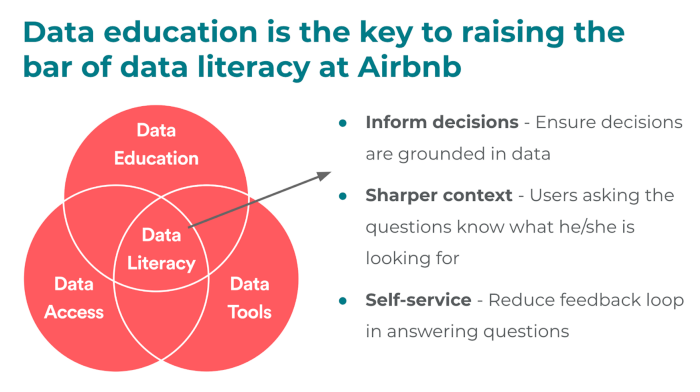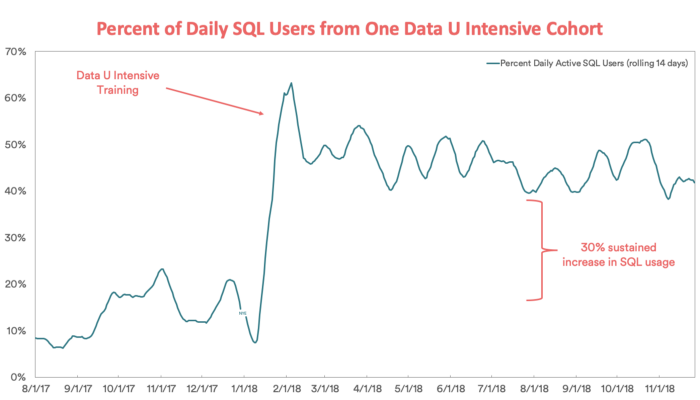Airbnb runs an internal data literacy program to upskill their staff and has taught valuable data skills to over 4000 employees. Data education is highly valued and is one of the three pillars of driving data literacy at Airbnb.
 Source: How Airbnb is boosting data literacy with data u intensive training
Source: How Airbnb is boosting data literacy with data u intensive training
Empowering business partners at Airbnb through data education had a huge impact on their data scientists:
Data scientists saw a fifty percent decrease in ad hoc requests when the teams they support went through Data U Intensive. When business partners can answer their own questions using basic SQL queries and dashboards, it frees up significant time for data scientists to work on higher impact projects which are crucial for the strategy and direction of their partner teams.
In this post, I’ll summarise some of Airbnb’s findings and add more based on my experience of personally teaching over 100 people how to do SQL analytics and building supercooldata which solves this exact problem.
Here are the top things you should do to start a data literacy program focused on SQL analytics at your company.
Find the right learners
Find a team that would benefit the most from learning SQL analytics. You want a team that’s very keen to learn, has plenty of use cases and can act as an early success story to show other teams.
It might be a good idea to put out a short survey in the company chat tool to gauge interest from different teams.
It’s not ideal that you start teaching people who you happen to know the most from your current work. Find those that are most desperate for answers and who are currently most under-resourced in analytics support.
Start small
I’ve previously taught larger groups of about 40 people as well as small focused groups of about 3 to 5. I had the most success with the small groups. You’ll have plenty of scheduling issues with the larger groups. This was the biggest reason people didn’t continue.
With a small group, you can build trust which makes it much easier for them to reach out when they need help.
You don’t need to train the whole company in 6 weeks. Have a plan to teach everyone who needs it within the first year and go slow and steady. You’ll also learn how to improve your program as you progress.
Setup your data environment
Make sure you have the right data environment to teach. A large enterprise company I worked at had an on-premise data warehouse with terrible performance. It could barely handle the queries the data people threw at it, let alone sub-optimal queries from people still learning.
When a marketer I knew wanted to learn SQL, she put in the application for an account with the DBA. She was rejected.
At another company, I couldn’t run the course until we had switched to Snowflake which could handle the concurrency. If I tried running a SQL course before we switched, I’m pretty sure the data engineers would have had a stern word with me and then deleted my account.
Relevant examples and data
Teach people how to analyse data using examples they can use on a day to day basis. It’s crucial to focus on SQL examples that they can take back and use on their own.
I once tried to teach a group of keen finance analysts how to do SQL analytics. That batch wasn’t successful, not because they didn’t want to learn SQL but because I should have familiarised myself with the finance data. I tried teaching them with content I had previously built for product managers.
One of the learnings at Airbnb was that their original format wasn’t personalised enough for learners. When they revised the program, they found that they needed to tailor the content to the specific datasets and needs of each business unit.
They released a team-specific version of Data University which had three key impacts:
- Learners were more engaged with the content
- Data scientists saw a 50% decrease in ad-hoc requests
- More dashboards were built independently leading to more data driven decision making
This is exactly what we’re doing at supercooldata, we’re making it really easy for data teams to teach their colleagues data skills with their own data and with use cases relevant to their role.
Productive from day one
I’ve seen SQL courses where a lot of time is spent at the start explaining databases, schemas and data types. Some even go into the differences between OLTP and OLAP right from the beginning. No one cares about this stuff except data people. Don’t bore them, show them how to get their answers. You can come back and revisit entity relationship diagrams, cluster keys, ACID and cloud data warehouse pricing later.
Start with simple SELECT queries, don’t bother with teaching how to create or update tables until they know how to select, filter and aggregate data.
The main goal from your first lesson should be to put a simple example in their hands that they can take back to their desk and use to answer questions they have today.
Regular practice is key
I ran weekly classes which were about one hour long. Each time I started teaching, I could tell who wasn’t getting it - it was the people who hadn’t run a query since the previous lesson (I checked the SQL logs before every lesson).
Once a week wasn’t enough, there needs to be homework or exercises they can do at least once every couple of days.
A learn-at-your-own-pace style interactive course with questions to complement your own teaching would be ideal.
Don’t binge it
One of my most keen students (hi, if you’re reading this) did an entire online course to learn SQL analytics over a weekend. She was hooked. She even taught me a few things I didn’t know.
She then forgot it all. Her work was very project-based and her current project didn’t need SQL.
I also ran long 3 or 4 hour Tableau training sessions for some teams once per quarter. It wouldn’t be long before those who took part in the training would come back again for help with basic things they learned in the sessions. It’s more important to run short regular sessions to re-enforce content rather than multi-hour bootcamp style sessions. This depends on the company and what you’re teaching, sometimes it could work but for a skill like SQL, it isn’t a great approach.
Metrics, metrics, metrics
As part of my program, I set up my own dashboards to measure my teaching performance. I took what I knew about product analytics and applied it to the Snowflake query logs.
I knew how many users I acquired, were active and were retained each week. Most importantly, I had a list of users who had churned recently. They hadn’t run a query for a while.
I would reach out to them and ask them if they had any outstanding data requests with the data team or if they needed help with anything. I would then draft a query for them based on something they needed immediately and send it to them to tweak and run. This turned around my retention numbers pretty quickly.
At Airbnb, the primary metric to measure success was Weekly Active Users (WAU).
 Source: How Airbnb is boosting data literacy with data u intensive training
Source: How Airbnb is boosting data literacy with data u intensive training
We can see in the above chart that they had a large bump initially and then it slowly declined due to some learners who churned. They had a sustained increase of 30% in SQL usage after almost a month!
It’s important that you monitor the success of your data democratisation initiatives the same way that you would monitor the success of your product. The data in your data warehouse is a data product that you’re selling to the rest of the business and so knowing your numbers is just as important.
Final thoughts
When I ran these SQL analytics courses, the main benefit I was focused on was freeing up the time of my analytics team from ad-hoc requests. People stopped coming to me with requests for CSV’s or charts, they wanted to know what the query was to get the answer they were looking for. They became self-reliant and empowered.
I found that those who were asking questions didn’t want to be a burden to the data team just as much as the data team didn’t want to write basic SQL queries. It was clearly a win-win.
I’ve now realised that the biggest impact I had during my career was from running these data literacy courses. That’s why I’m now working on supercooldata with my brother.
We want to help other data teams get out of the vicious cycle of mundane data requests. We want to empower teams with the data skills they need to be self-reliant - starting with SQL analytics.
If you want to teach SQL analytics with your data, sign up for the supercooldata business plan.
If you want to learn more about Airbnb’s approach to data literacy, have a read of their post here.